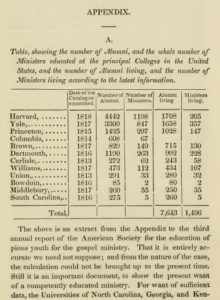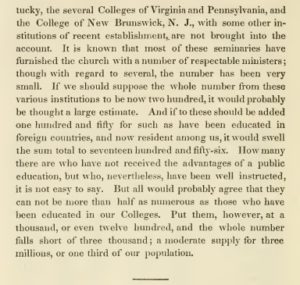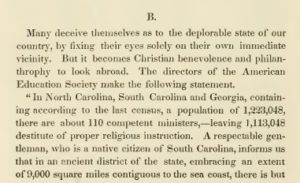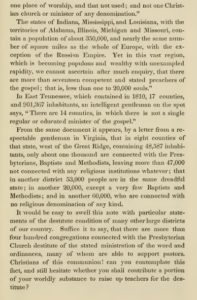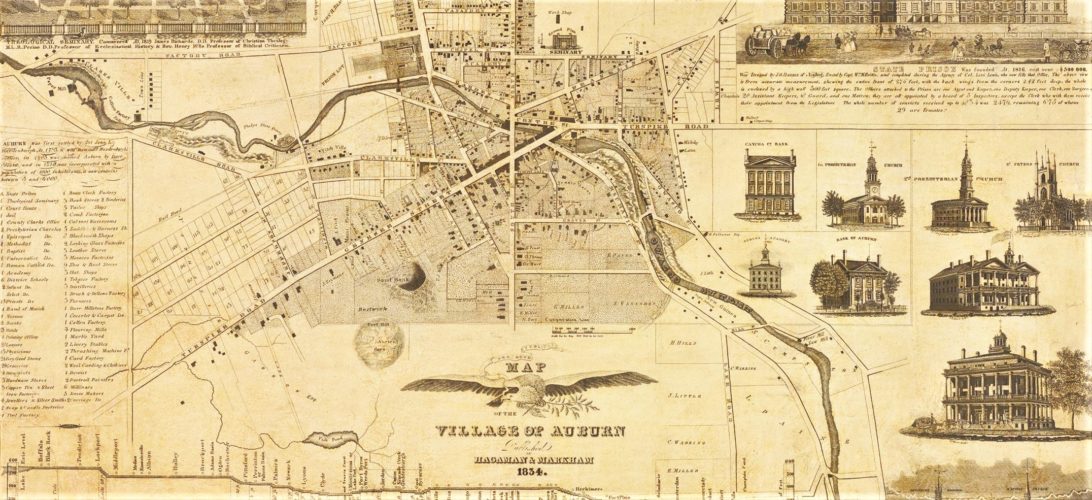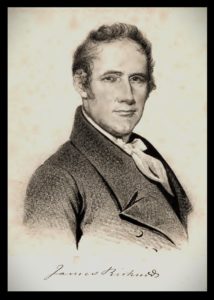 The “Duty of Sustaining an Educated Ministry,” was delivered by James Richards, May 12, 1819, in Cedar Street Presbyterian Church, New York. It has been transcribed from Sermons of the Late Rev. James Richards, D.D., With an Essay on His Character, edited by William B. Sprague, 1849. The week after Richards delivered the sermon the General Assembly of the Presbyterian Church in the United States of America (PCUSA) convened in Philadelphia where reports tallied from the presbyteries regarding the number of candidates that were poor and pious youths studying for the ministry was announced as 59. Richards’s interest in education was apparent because he had been elected to the first Board of Directors of the Theological Seminary at Princeton when it opened the fall of 1812. The 1819 General Assembly established its Board of Education when it adopted the report of its study committee that included Richards. It must have been particularly gratifying for the assembly’s moderator, John H. Rice, because he had been promoting improvement of the Presbyterians’ educational program in general with emphasis on the poor and pious. Richards had been moderator of the General Assembly in 1805 and at the time of delivering “Duty of Sustaining an Educated Ministry” he had been pastor of First Church, Newark, for ten years. In 1824 he would resign from the Princeton Seminary board as he changed call to become Professor of Christian Theology in Auburn Seminary.
The “Duty of Sustaining an Educated Ministry,” was delivered by James Richards, May 12, 1819, in Cedar Street Presbyterian Church, New York. It has been transcribed from Sermons of the Late Rev. James Richards, D.D., With an Essay on His Character, edited by William B. Sprague, 1849. The week after Richards delivered the sermon the General Assembly of the Presbyterian Church in the United States of America (PCUSA) convened in Philadelphia where reports tallied from the presbyteries regarding the number of candidates that were poor and pious youths studying for the ministry was announced as 59. Richards’s interest in education was apparent because he had been elected to the first Board of Directors of the Theological Seminary at Princeton when it opened the fall of 1812. The 1819 General Assembly established its Board of Education when it adopted the report of its study committee that included Richards. It must have been particularly gratifying for the assembly’s moderator, John H. Rice, because he had been promoting improvement of the Presbyterians’ educational program in general with emphasis on the poor and pious. Richards had been moderator of the General Assembly in 1805 and at the time of delivering “Duty of Sustaining an Educated Ministry” he had been pastor of First Church, Newark, for ten years. In 1824 he would resign from the Princeton Seminary board as he changed call to become Professor of Christian Theology in Auburn Seminary.
The header is snipped from “Map Of The Village Of Auburn. Published By Hagaman & Markham 1837. Engraved by M.M. Peabody for the Publishers. (inset) Profile of the Grand Erie Canal,” as on Internet Archive. The portrait of Richards is the frontispiece of his book of sermons. The two appendices referred to in the text are at the end of the sermon. Several of Richards publications are available for convenient PDF download on the Log College Press website at “JAMES RICHARDS, 1767-1843.”
Barry Waugh
“Duty of Sustaining an Educated Ministry”
James Richards (1767-1843)
Romans 10:14
And how shall they hear without a preacher?
We are assembled this evening to contemplate an interesting object of charity, which is training up indigent and pious youth for the gospel ministry; an object not new to the Christian world, but perhaps one that has never been embraced with zeal as its importance requires.
It is gratifying to believe that the friends of Zion are beginning to awake to this subject, and that the day is not far distant when ceasing to look with an eye of indifference over the vast fields already white to harvest, they will feel as if the time had fully come not only to pray for more laborers but to put forth all their strength in preparing men for this service.
The efforts which have been made within the last ten years may be considered a joyful pledge of what is yet to be done by this benevolent enterprise. But the object must be seen by us in all its magnitude before it will be taken up with sufficient energy. We must come to believe that the gospel ministry is the grand instrument for carrying into effect the purpose of salvation—that there is an alarming deficiency of men in this sacred office—and that it is our duty, to the utmost of our power, to increase their number.
These topics suggested by the text and by the passage with which it is connected will be the object of the present discourse to set a little more distinctly before you three points.
FIRST. That the gospel ministry is the grand instrument of carrying into effect the purpose of salvation.
The Apostle Paul asserts that under the dispensation of the gospel
there is no difference between the Jew and the Greek; for the same Lord over all is rich unto all that call upon Him. For whosoever shall call upon the name of the Lord shall be saved. How then shall they call on Him, in whom they have not believed? And how shall they believe in Him of whom they have not heard? And how shall they hear without a preacher? And how shall they preach, except they be sent? as it is written, “How beautiful are the feet of them that preach the gospel of peace, and bring glad tidings of good things!” (Romans 10:12-15)
That the living teacher is here meant, in distinction from the revelation which God has made of himself, is too obvious to require distinct proof. The Apostle’s argument is plainly this—Men must call upon the name of the Lord, that is, the Lord Jesus, and thus recognize the truth of his mission and the glory of his divine character, in order to be saved; they must believe in Jesus that they may call upon him; they must hear of him to believe; and he must be preached to them, and preached by those who are sent, that they may hear. And hence the conclusion, “So then faith cometh by hearing, and hearing by the word of God” (Romans 10:17).
But does faith never come but where the word of God is heard from the living teacher? It is not necessary to press the inference to such a length. It will be enough if we adopt what appears to be the sense of the Apostle, that the preaching of the gospel by men duly authorized is the principal means appointed by God for salvation; and that ordinarily, we are not to expect men to believe unto life eternal where this institution is either grossly perverted or entirely wanting. This is a point of too much consequence not to command our attention. Ever since the revelation of mercy to this lost world, God has called some to make known his will and to inculcate a scrupulous regard to it. It was so in the patriarchal ages, before and after the flood. It was so preeminently under the Jewish dispensation, when, besides prophets who were raised up to perform special services, one whole tribe, nearly every twelfth man in the nation, was devoted to the work of the sanctuary, which included the offices of religious instruction. When the Lord Jesus appeared in the flesh, he himself became a preacher of righteousness, then as soon as he prepared his disciples, he sent them out clothed with authority to dispense the word of life. After he had risen from the dead, he enlarged their commission and charged them to go forth among the nations and preach the gospel to every creature, adding, “Lo, I am with you always even unto the end of the world;” a promise which not only sanctions the ministry of the word till his second coming, but declares his supreme importance as a mean of salvation. In accordance with this, we are assured, that, “When he ascended up on high…he gave some, apostles; and some, prophets; and some, evangelists; and some pastors and teachers, for the perfecting of the saints, for the work of the ministry, for the edifying of the body of Christ” (Ephesians 4:8-12).
The mere fact that the ministry of reconciliation is established as a perpetual ordinance in the church, is no slender indication of its high instrumentality in the business of our salvation. But when we read, that it was expressly designed “To turn men from darkness to light and from the power of Satan unto God,” and that it is that “By the foolishness of preaching, it pleases God to save them that believe,” we cannot hesitate to place it first among the means which divine wisdom has selected for bringing men to the knowledge of the truth.
Nor let us suppose that the great Head of the church will ordinarily dispense with this means. While it does not become us to limit the Holy One of Israel, and while we admit that nothing would be easier than for Him to enlighten and sanctify the soul without the agency of men, yet it is not derogatory to Him to say that this is not to be looked for. He is a God of means and often uses them when it is manifest they have no other tendency than to show the dependence of the creature, and the glory of his power. Thus it was when He told Moses to stretch forth his rod over the sea and divide it, and make a way for the ransomed of the Lord to pass over; and then by means of the same rod he brought water out of the rock to satisfy his thirsty people in the wilderness. We have an example of the same kind in the way our Lord made the clay to open the eyes of the man born blind. In neither case was there any tendency to accomplish the means in themselves, except so far that they were of divine appointment. And we naturally conclude that if in cases of such an extraordinary character, God has chosen means to bring about his purpose, He will not readily depart from those which He has formally established in the more ordinary dispensations of his providence. Where these are settled and known, it is presumption to expect the end without them. Who ever thinks of reaping without sowing? Or gathering his harvest without laborers? Scarcely less irrational would it be to expect the gospel to spread and take effect without the agency of those whom Christ has called to minister in his name. Surely God will not work a miracle to set aside his own institutions, and to encourage his people in sloth.
We derive an argument for the necessity of the gospel ministry from the very condition of our fallen race, ignorant of God and of themselves, slaves to their guilty passions, and secure in an evil course.
To accomplish their salvation you must awaken their attention—penetrate them with a sense of their sins, and through the knowledge of a Saviour, lead them back to God whom they have forsaken. What means will you employ? Will you send them the Bible? They are so deeply immersed in their cares and pleasures; so entirely alienated from everything which the Bible either reveals or inculcates, that they will not go to this sacred book for instruction. If they should, it would seldom be with that interest or intelligence that would promise any important result. Its sublime and glorious doctrines would not readily be understood, either separately considered, or in the important relation which they bear to each other. Much ignorance pervades the minds of many to whom the gospel is constantly, ably, and faithfully preached, which is proof of what the result would be if this important privilege was denied.
I venerate the zeal which is now awake to spread the Bible through the earth. I feel confident that the hand of the Lord is in this movement; and that the issue will be the advancement of the cause of truth and righteousness in the world. But the Christian ministry must rise and be carried forward with it, or the effort will in great measure prove abortive. There must be men skilled in the word of life, to lay open its doctrines and inculcate its precepts—men of holy and apostolic zeal to proclaim its sanctions and rewards—men who expostulate and intreat in Christ’s name, living depositaries of the truth, whose example no less than their doctrines, shall preach loudly to a sinful world. Without a provision of this kind, little will be accomplished in the great work of salvation, though you should translate the Bible into every language under Heaven, and diffuse it as widely as the habitations of men.
What would become of the arts and sciences, notwithstanding their present foothold in society, and the volumes in which their principles are ably discussed, were we at once to shut up every place of instruction and to banish from the earth those whose business it is to teach them? How soon would the lights of science be put out and men return again to a state of barbarism? Why should it not be so with respect to religion, the most profound as well as most important of all sciences? And the rather, because there is in the human heart a deep aversion to its sacred truths.
If any still doubt about the subject, then let the history of the church be appealed to. Where has the gospel prevailed without the instrumentality of its ministers? Where has it been planted, or were taken root, but through the assiduous labors of men commissioned by God and devoted to his cause?
Individuals indeed may have been brought to the knowledge of the truth without such aid; but the instances are so rare, and so entirely aside from the ordinary course of events, as in no degree to justify the expectation that much good will ever be accomplished in this way. Such cases, when they have occurred, have generally attracted great attention; a single case of this kind has sometimes been thought sufficiently wonderful to be proclaimed throughout the Christian world. But let us not be deceived; whatever opinions may have been broached, or expectations indulged, God has appointed the ministry of the word as the grand instrument of salvation, and He will not dishonor his own institutions by working without them. He has committed the treasure of the gospel to earthen vessels, that the excellency of the power may be of Him; still these vessels, by the laws of his house and the order of his providence are necessary. And they are necessary not only for the instruction of the ignorant and conversion of the wicked, but for the establishment, the sanctification, and comfort of believers. This is strongly and distinctly asserted in a passage already quoted, where Christ, upon his ascension, is said to have given apostles and prophets, evangelists, pastors and teachers,
For the perfecting of the saints, for the work of the ministry, for the edifying of the body of Christ; till we all come in the unity of the faith, and of the knowledge of the Son of God, unto a perfect man unto the measure of the stature of the fullness of Christ. (Ephesians 4:12-13)
We cannot dwell upon this article, or it might be shown from the deplorable effects which usually follow a mere suspension of the gospel ministry in places where it was once established, that little can be expected in the cause of truth and virtue without it. Where there is no living teacher to lift up his voice, how soon do men lose their reverence for the sabbath and for every institution of revealed religion, while they sink into habits of profligacy and vice requiring the labor of years to remove. Many such examples could easily be pointed out in our own country.
SECOND. To call your attention to the alarming shortage of men qualified to preach the gospel.
God has never left his church without a valid ministry, nor is there any reason to fear that He will. But seasons have occurred when men employed in this sacred office have been so few in number, so corrupt in doctrine, or manifestly incompetent to the duties of their vocation as to make a famine of the word of life the inevitable consequence. Such was the fact in many periods of Jewish history, as the prophets themselves have borne witness. Such to an extensive degree was the case during our Lord’s abode in the flesh; and hence his compassion towards the multitudes, who at great expense and fatigue, flocked from distant parts of the country to hear him. He regarded them as sheep without a shepherd, because the shepherds which they had, though sufficiently numerous, did little else but scatter and devour the flock. This poor state of things powerfully touched the heart of the Lord Jesus and led him to say to his disciples,
The harvest truly is plenteous, but the laborers are few; pray ye therefore the Lord of the harvest, that he would thrust forth laborers into his harvest. (Matthew 9:37-38)
From that period to the present the same distressing truth has been exhibited to the eye of the church, but, alas, I too often without exciting those emotions which so solemn and portentous a fact ought to create. And what can we hope even now, by making a statement that is perhaps familiar to you all? But in the name of the Lord, I desire you to lift up your eyes to the heathen world, and behold the innumerable multitudes living in the region of darkness and shadow of death—hastening with the certainty and rapidity of time down to the abodes of everlasting sorrow. On them no light of salvation shines. There Satan, the god of this world, holds his cruel reign, receiving with the light of every returning day his thousands of victims offered upon the altar of pollution and blood.
According to calculations recently made, Asia and Africa together contain six hundred million people, but only five million have embraced Christianity under any form. All the rest, comprehending six parts out of eight of the whole human family, are still under the dominion of the most fatal delusions. But have they no missionaries? Are none gone to them to point out the way of life? Not one, my dear brethren, to a million I The benevolence of the whole Christian world has not yet furnished them with four hundred preachers. What a spectacle is this for those that love our Lord Jesus Christ, and believe that one human soul is of more value than the temporal interests of a world! How forcibly does it bring home the truth, that the harvest is plenteous and the laborers few.
But if we turn our attention to that portion of the world denominated Christian, what a deficiency shall we find of qualified teachers? What multitudes, held in the night of ignorance, almost as far from the way of salvation as the very heathen? Look at the present state of the Greek and Roman churches. How few among them preach the gospel that God ordained as the means of eternal life! Without going into the history of their doctrines, it will not be denied that they have fallen into gross errors, so that while they retain the name they have little left of the purity and excellence of Christianity. The same remark might be extended to not a few of the Protestant churches that have strangely departed from the principles of the reformation and imbibed heresies. Wherever this is the case, the people are as sheep without a shepherd, whatever may be the number of their religious teachers and however such teachers may claim to be the lights of science and religion. If they do not preach Christ in the glory of his divine nature and in the offices he sustains in the work of our redemption, they are not his ministers—they bring not his doctrine, that which distinguishes his religion from every other system.
My design, however, is to fix your attention chiefly on the deplorable deficiency of religious teachers in our own country. Those who have investigated this subject, pronounce with confidence that with a population exceeding nine million we have not more than three thousand educated ministers of all denominations (see Appendix A). Allowing one minister to two hundred families or about a thousand souls, we have a supply for only three million, leaving six million or two thirds of our population without a minister.
This fact, alarming in the gross, is still more so in detail. For while some parts of the country have a supply nearly equal to their demand, large districts are found of fifty and of a hundred thousand souls, where the sound of the pastor’s voice is never heard, and where the inhabitants sink daily deeper into moral darkness leading to the most pernicious and degrading heathenism (see Appendix B).
I can not descend to the particulars on which this remark is founded, nor stay to fill up the gloomy picture which will suggest itself to every thoughtful mind in this assembly; yet, I must be permitted to add what is known to many of you that this melancholy state of things is far from assuming a more encouraging appearance as time advances, that it is every day increasing with the rapid progress of our population, and to the eye that looks forward only to few generations, presents a scene truly appalling to the pious heart. In less than half a century, if our numbers continue to advance in the ratio of former years, we shall have forty million people while the ministers increase as they have done for fifty years past and will not reach twice their present number. What a painful anticipation of the future! More than thirty million of our countrymen abandoned, “not to a famine of bread, nor a thirst for water; but of hearing the words of the Lord” (Amos 8:11).
Be assured my brethren, this statement is not overdrawn. It rests upon facts of unquestionable authority, and is but the recognition of causes long since at work, and whose results, without the special interposition of Providence, will be in time to come, as they have been in times past. But leaving futurity in the hands of Him who sees the end from the beginning, and who in his government of the world often disappoints the hopes and fears of mortals, the present aspect of our own country is that of a field already white to the harvest while the laborers that go forth into it are few compared with the mighty work to be performed. Yes, there are hundreds and thousands anxious to hear the gospel, and continually lifting up their cry for teachers, who after all their solicitations, cannot be supplied. This is a fact which ought in a peculiar manner interest us. I do not say that we are to be indifferent to the wants of the human family generally; I admit that our benevolence should be large enough to embrace every darkened corner of the earth, and that our zeal to spread the gospel ought to be of such strength as to send the heralds of salvation to the utmost bounds of either continent, and to the islands of the sea. But surely it is a paramount duty to feel for the destitute at home; to look with an eye of peculiar tenderness on those who are bone of our bone and flesh of our flesh; and whom the providence of God has placed within the sphere of our action. To drive these children of want from our door, or with a heart of indifference to allow them to famish in our sight, would mark a species of insensibility, in a peculiar manner offensive to the Father of mercies, and reproachful to the Christian name.
But what can be done? Wherewith shall we find bread to feed so great a multitude? If the Lord would open the windows of Heaven there might indeed be hope! But Christians, is not this the whispering of unbelief? Contemplate the subject in the light of your responsibility; dwell upon it with hearts of tender and growing compassion; let the cry of perishing millions vibrate in your ears, till the hum of business and the song of pleasure are lost in the sound—and then say if something cannot be done. The truth is, the path of duty lies plain before us; nor are there any difficulties which the patient energy of enlightened zeal will not overcome. Be it so, that we want some thousands of ministers, to supply the deficiency in our own country, and even a larger number to send abroad among the heathen; let us not be dismayed at the prospect, but commence the work of preparing them in the name of the Lord, leaving it to those who come after us to complete what we have begun.
THIRD. This is the duty which I proposed in the third and last place to set before you.
But here a question of deep importance arises. What sort of men do we want? Some in their zeal to supply the necessities of the church appear to have lost sight of this enquiry, and have literally thrust men into the ministry who were wholly incompetent to its duties; men who besides being led away by error, have lowered the standard of the sacred office and brought it into contempt. Such laborers do but impede the operations of others, and render the harvest even more difficult to collect than if they had never entered into it.
Two things are requisite in those who preach the gospel; they must have piety, and they must have ability. They must have piety: without this they would be only like the blind leading the blind, while they would lack that pure and ardent zeal for the glory of God and the salvation of men, which is so needful to their fidelity and success. I do not say that a man may not preach to the salvation of others while he himself is a stranger to vital piety. Doubtless there are multitudes, who have preached an unknown Saviour and yet have been instrumental in the conversion of others. The efficacy of the word depends not on the holiness or will of him who ministers it, but on the energy of the divine Spirit. Still however, God will honor those that honor Him, and other things being equal, He is more likely to crown with success the labors of ministers who seek to do good and to promote his glory, than of those who merely sacrifice to their own net and burn incense to their own drag. Without a renovated heart indeed, no man can have a call to preach the gospel, whatever his other qualifications; and woe be to him if he enters upon this holy service without this deep and essential requisite.
But piety alone, however sincere or even ardent, is far from being sufficient. He must be able to teach, as well as willing. Ignorance in any profession is a calamity; but here it is truly deplorable. Here men deal with subjects of the greatest possible moment—with interests vast and immeasurable as eternity. Men will not trust an advocate with the defense of their rights if they know him to be ignorant of the law, or the facts involved in their case. They will not employ a physician who is confessedly unacquainted with the healing art; and shall the soul, the never dying soul, be entrusted to hands where there is no wisdom to counsel, no capacity to instruct, and where mere ignorance as well as mistake may prove fatal to all that is dear in its future existence? Reason dictates a different course, and the great Head of the church has solemnly prescribed it.
He has ordained that men who preach the gospel should be deeply acquainted with the truths of the gospel. “The same commit thou to faithful men, who shall be able to teach others also” (2 Timothy 2:2). And again, “Not a novice, lest he be lifted up with pride and fall into the snare of the devil” (1 Timothy 3:6).
They who are admitted to the work of the ministry, should possess a sound understanding well cultivated by study; they should have an acquaintance with the general subjects of literature, and particularly with such as stand more immediately connected with their sacred employment. This, at all times necessary, is perhaps peculiarly important at the present day, when not a few who profess to be lovers of the sciences despise the humbling doctrines of the cross. But above all should they be thoroughly versed in the word of life, that they may be able by sound doctrine both to exhort and to convince the gainsayers; to put to silence the ignorance of foolish men; and as wise scribes well instructed in the kingdom, to bring out of their treasure things new and old. No attainments in mere human science, will make up for this. Be men ever so learned or eloquent, if the gospel be not understood, its glorious truths cannot be clearly exhibited and made to bear upon the conscience; and where this is not done, the chief object for which the gospel ministry was instituted is lost. Give us ministers then who both understand and love the truth, and who are willing to make any sacrifice in its cause. There are the teachers whom God’s word approves—men who are capable of serving the church, and whose labors she now calls for, to build up her wastes and to extend her promised empire over the earth. Shall we hear her call, and set about the good work of increasing the number of such teachers?
That this is our duty is just as certain as that our agency is at all demanded to promote the great work of salvation and the glory of God’s name. But what does this duty imply? Most certainly, that we offer up daily and ardent prayer for the spirit to be poured out upon our schools and colleges, and upon our young men generally, that those who have the requisite natural gifts may be furnished with spiritual qualifications for the gospel ministry; that we carefully seek out the youth thus designated and encourage them to look forward to this sacred office; and where it is necessary (and that it will be necessary to a great extent, there can be no question) that we afford them pecuniary aid. This is what the great Head of the church demands of us, and what by his word and providence He has long pressed upon our attention. Shall we now hear his voice, and engage in this charity with a steady and enlightened zeal, which knows no relaxation or intermission till the object be accomplished?
It is an undertaking which is peculiarly expressive of our love to Him who shed his blood in our behalf, and but a just acknowledgment of the high-born privileges we possess. Nay, it associates us with him who is the great lord of the harvest, the first born from the dead, and the prince of the kings of the earth. It was a part of his work while he tabernacled in the flesh to provide pastors and teachers for the destitute—and though now exalted to his throne in the Heavens, he still makes this an object of his care. Will it be no honor to be found active in the same cause? I know of no charity more elevated in its design, or more important in its result. It is vital to all the best interests of man. Do you love your country? Can you promote her prosperity more effectually than by increasing the number of those, who shall essentially contribute to diffuse the lights of science and religion—men who shall foster your schools, and take an active part in the instruction of the rising generation? Without a measure of this kind, what security can you have for. your civil institutions? Can these be supported without the aid of moral virtue? Can you hope for the existence of this without the preaching of the gospel and the regular administration of its ordinances? Politicians may contrive, legislators make laws, and philosophers dream, but where Jesus Christ is not preached, the great principles of morality will neither be understood nor regarded.
If the history of the world can throw any light upon the character of man, it teaches this truth if no more, that without revelation, and this faithfully expounded, he will not attain to the knowledge of God, and that without this knowledge, he can not be restrained from the most odious vices. We hold it a position clearly demonstrable, that without religion there can be no morality—and without morality, no well ordered and peaceful society. The alternative then lies before us, either to maintain and promote religion, by providing a competent and faithful ministry, or to sink into moral degradation and ruin.
Nor is the time distant, unless we can be roused to a sense of our danger, when the consequences of our supineness will be deeply felt. The facts have been stated, which tell you how far already population has gained upon the means of moral culture; what widespread regions have become wastes, and what the inevitable result in a few years will be, if the Christian and philanthropist do not awake, and put forth all their energy to check the mighty evil.
But why do I speak of the temporal interests of men? What will become of their souls? We have been told of the vast multitudes who are as sheep without a shepherd, having none to heal them when diseased, to bind them up when broken, and to bring them back when driven away. We are assured that the shades of moral darkness are thickening upon them, and that the hour hastens when if no relief be afforded, the last beam of light will be extinguished. Were we ignorant of their state, we might slumber over their destiny with comparative innocence, and they might find their way to the pit, without drawing down the guilt of their blood upon our heads. But we know their condition; we know that they have no one to break to them the bread of life; and that if eternal mercy does not step aside from its ordinary course to save men without the ministry of the word, they must go down to the chambers of death. Why, let me ask, has the providence of God disclosed this fact but to touch our hearts and stimulate our exertions? To us they look with an imploring eye; and God will make us answerable if through our want of effort, they shall implore in vain. But think, my dear brethren, of the vast amount of good which this scheme of benevolence proposes.
When you have fed the hungry and clothed the naked, you have performed an act of charity which is grateful to your feelings, and which if done out of love to your Saviour will not be forgotten by Him when the universe shall be assembled at his bar. When you have instructed the ignorant or reclaimed the vicious you have done an important service to individuals, and are entitled to the thanks of society; and if you have ever converted a soul to the living God, you have been instrumental of a good that far outweighs the mere deliverance of a nation from the greatest earthly calamities. But what is this compared with having given to the church one able and faithful minister of the New Testament, who, in the ordinary course of providence, may be instrumental of saving hundreds from the gates of perdition and making them heirs of immortal life. Who knows in this case if you do not begin a work of mercy which shall go on with progressive energy till the last day? Such a minister may be the means not only of saving many by his personal labors, but of raising up others in this blessed work—and these, others who shall convey their spirit to a new generation, till all the earth shall hear and all the ends of the world be turned unto the Lord.
I press this subject with the greater confidence, from the interest it has awakened in other parts of the church, and from the fact that there are many young men of hopeful piety and promising talent, now waiting to be drawn from their less important spheres into the ministry of the gospel.
In the eastern section of our country, a single society organized two years ago, have already two hundred youth in different stages of their education destined to the gospel ministry. Our brethren to the west, have also gone before us in this work and labor of love; and besides collecting considerable funds for the object, have taken up about thirty young men, who are fitting to enter the Lord’s vineyard. They tell us that two hundred more from their own district could be added to their present list, had they the means of support. Shall we not rise up to the same work, under the influence of such noble examples? There is no want of men for this operation. God has prepared them by the requisite natural gifts, and by the sanctifying power of his grace. It is ours to search them out, and furnish them with the means of education. If we will not embark in this enterprise, where is our love to the Saviour—where is our love to the souls of men? Can we be Christ’s friends, if we do not possess his spirit? Can his spirit dwell in us, if we feel not for the uninstructed multitudes as he did? Or can we with sincerity pray to him as the great Lord of the harvest to send forth laborers into his harvest, while we do not cheerfully put our own hands to the work, and endeavor to increase their number?
The society, in whose name I address you, is organized for the express purpose of raising up ministers for the Presbyterian church. They will select none for this object but those who in the judgment of charity are the real friends of Christ, and who in the spirit of self denial are willing to devote their lives to the promotion of his cause; men whose talents are such as to give a reasonable pledge of their usefulness. And they intend not to send them forth, till they have made those attainments in human and divine knowledge which the rules of our church have wisely prescribed.
We know indeed that this is an undertaking of great responsibility—that in the selection of the youth and the application of the funds the soundest discretion will be called for, and that no human wisdom will be sufficient always to prevent mistake. But the object is one of the highest moment, involving in it the dearest hopes of man; nor can we think of relinquishing it on account of the difficulties which it presents. The work is of the Lord, and He will make it prosper, if we take counsel of Him. We come to you, brethren, to ask your aid in this important design—to give, as God has prospered you, and to send up your prayers to Heaven for a blessing to rest upon your gift from your bounty. Who knows but the salvation of hundreds is suspended on the charities of this evening?
Twenty young men of promising talents have already been selected anil placed upon the funds of our infant institution. With hearts burning with love to the Saviour, they long to be prepared to preach to the destitute the everlasting gospel in his name. Shall they be encouraged in this desire? Or must we say to them, there is no hope—the bosom of piety does not feel—the hands of beneficence are not open—return to your former occupations, and sigh in secret over the woes which you cannot relieve?
I will not anticipate such a result. I trust that an institution, founded in benevolence, and aiming at a good so immense, will find a patronage in every heart that loves our Lord Jesus—in every friend of man. The cry of perishing millions in heathen lands, unites with the voice of thousands in our own country, to increase the number of those who publish the gospel of peace, who bring glad tidings of good things. Let us with cheerful hearts cast our offering into the treasury of the Lord—and seek to become partakers with them who are instrumental in turning many to righteousness, and who shall shine as the brightness of the firmament, and as the stars for ever and ever.
APPENDICES
